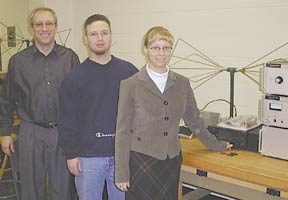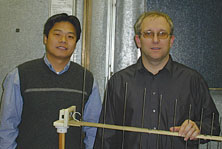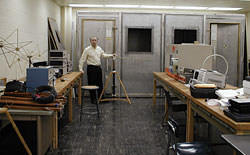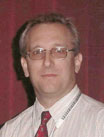| EMC
Education at the University of Michigan - Dearborn |
What started out with a $10,000 IEEE grant in 1999 in order to help incorporate EMC into the Electrical and Computer Engineering (ECE) courses at the University of Michigan - Dearborn, has grown into a key part of the undergraduate curriculum and the engineering continuing education programs! The accomplishments that have been achieved since the Winter 2000 term are significant and include:
The IEEE grant was initially pursued by the ECE department chair,
Dr. M. Shridhar, in response to a request he received to look
at how the topic of EMC could be covered at the university level.
In developing the rationale for the grant, Dr. Shridhar requested
and received outstanding industry cooperation through the efforts
of many EMC professionals located in the Southeast Michigan region,
many of whom are members of the IEEE EMC SE Michigan Chapter.
This cooperation resulted in the preparation of an outline of
an EMC curriculum content, selection of appropriate reference
materials (primarily textbooks), and the identification of a need
for a laboratory facility to assist the students in their understanding.
In order to introduce the topic to current students, the university
then conducted a series of guest lectures on different aspects
of EMC. These lectures were well received and indicated the potential
viability of full-term course(s) in EMC at the campus.
In the Winter 2000 term the first course in the EMC sequence
(ECE 319) was taught by Mr. Jim Muccioli, a well-known EMC professional
from the Detroit area. This course is an introduction to the EMC
discipline, how it has evolved, its impact on product design practices,
and what basic techniques are used to minimize EMC issues in components
and systems. Since the Fall 2000 term, the curriculum has been
taught by Mr. Mark Steffka, an EMC Specialist at General Motors,
and an Adjunct Lecturer in the UM-D ECE department. The course
that was first offered for the Fall 2000 term was ECE 420 - which
builds upon the fundamentals covered in ECE 319 and incorporates
a study of test methods and instrumentation used in EMC. ECE 319
utilizes Henry Ott's text, "Noise Reduction Techniques in
Electronic Systems" and the textbook for ECE 420 is Dr. Clayton
Paul's book "Introduction to EMC". (Since the Winter
2001 term, Mr. Steffka has also been the instructor for ECE 319).
Initial feedback from both university students and faculty has
been very positive and supportive of this curriculum! As a result,
Dr. Shridhar and Professor John Shen believed that the university
should pursue a grant from the NSF to assist the campus in establishing
an EMC laboratory to be located in the engineering building. In
May 2001, a proposal was submitted by the university to NSF emphasizing
the role that the university could fill in response to the EMC
needs of the automotive industry, due to the campus' unique heritage
and links to the automotive industry "Big Three". (This
involvement with the automotive industry has now taken on a much
deeper and comprehensive role due to many other automotive OEM's
and suppliers locating in the Detroit area.) Late in 2001, the
university did receive a grant from NSF for the establishment
of an EMC laboratory to be located on campus. Key to this grant
award was the recognition by NSF that the university has active
involvement in the curriculum by automotive industry EMC professionals
and that their contributions provide the important "real
world" balance that is needed.
What's next for the University of Michigan - Dearborn EMC curriculum?
In summary, thanks to the initial grant from the IEEE EMC Society,
the University of Michigan - Dearborn has been able to demonstrate
its commitment to EMC education for both today's working engineers
and engineering students (who will be tomorrow's engineers)! It
is hoped that the seeds sown in this work will benefit many for
years to come.
|
||||||||
|
If you would
like to contact the IEEE Webmaster |




 Mark
Steffka has over 20 years experience in the design, development,
and testing of military, aerospace, and automotive electronics.
He is currently an Electromagnetic Compatibility (EMC) Technical
Specialist with the General Motors (GM) Powertrain Group, supporting
the product engineering organization with respect to EMC design,
testing, and specifications. He is also an Adjunct Lecturer at
the University of Michigan-Dearborn, in the Electrical and Computer
Engineering Department, where he is the instructor for the EMC
courses that are offered at the campus. His educational background
consists of a B.S.E.-E.E., from the University of Michigan, and
a M.S. in Management from Indiana Wesleyan University. His involvement
in professional activities includes the Society of Automotive
Engineers Electromagnetic Standards Committees, and the Institute
of Electrical and Electronics Engineers (IEEE) Southeastern Michigan
Chapter of the EMC Society. In 1998, he was the co-author of the
"Automobiles" chapter in the ARRL RFI Book, which was
published in 1998. He is an amateur radio operator (WW8MS) and
was first licensed in 1975. He may be contacted at
Mark
Steffka has over 20 years experience in the design, development,
and testing of military, aerospace, and automotive electronics.
He is currently an Electromagnetic Compatibility (EMC) Technical
Specialist with the General Motors (GM) Powertrain Group, supporting
the product engineering organization with respect to EMC design,
testing, and specifications. He is also an Adjunct Lecturer at
the University of Michigan-Dearborn, in the Electrical and Computer
Engineering Department, where he is the instructor for the EMC
courses that are offered at the campus. His educational background
consists of a B.S.E.-E.E., from the University of Michigan, and
a M.S. in Management from Indiana Wesleyan University. His involvement
in professional activities includes the Society of Automotive
Engineers Electromagnetic Standards Committees, and the Institute
of Electrical and Electronics Engineers (IEEE) Southeastern Michigan
Chapter of the EMC Society. In 1998, he was the co-author of the
"Automobiles" chapter in the ARRL RFI Book, which was
published in 1998. He is an amateur radio operator (WW8MS) and
was first licensed in 1975. He may be contacted at